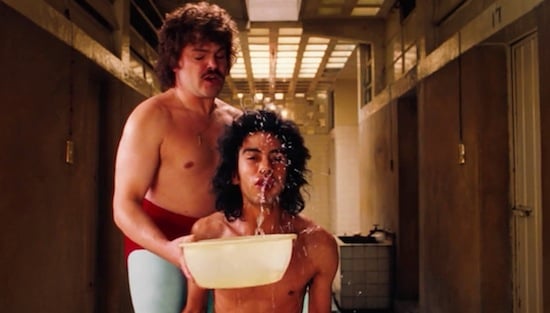Shocking Blocking (47)
By:
May 26, 2013

Wrestling “is not a sport,” noted Roland Barthes, in “The World of Wrestling,” a trailblazing 1952 example of semiotic cultural analysis. It is instead a “spectacle,” one whose “primary virtue [is] to abolish all motives and all consequences.” In the lowbrow, amateur (“true”) wrestling “performed in second-rate halls,” Barthes elaborates, there is no story; there is only a kaleidoscopic assemblage of “moments” over which — like a jigsaw puzzle — viewers are invited to brood. For precisely this reason, although it has been savaged by middlebrow critics in search of a plot, I can’t get enough of Jared Hess’s amateur-wrestling movie Nacho Libre, a sum of spectacles (to quote Barthes) of which no single one is a function. At the level of form Nacho Libre is a “writerly” text, one whose unity is forever being re-established (Barthes, again) by its composition; as such it bears comparison to Scorsese’s Goodfellas. Extract the perfunctory story-advancing scenes set at the monastery where Ignacio (Jack Black) works, ignore even the movie’s actual wrestling scenes, and you’ve still got brilliant moments like the one shown here — in which religious codes and wrestling codes intermingle, in a way that is somehow at once both funny and moving.
An occasional series analyzing some of the author’s favorite moments in the positioning or movement of actors in a movie.
THIRTIES (1934–1943): It Happened One Night (1934) | The Man Who Knew Too Much (1934) | The Guv’nor (1935) | The 39 Steps (1935) | Young and Innocent (1937) | The Lady Vanishes (1938) | Mr. Smith Goes to Washington (1939) | The Big Sleep (1939) | The Little Princess (1939) | Gone With the Wind (1939) | His Girl Friday (1940)
FORTIES (1944–1953): The Diary of a Chambermaid (1946) | The Asphalt Jungle (1950) | The African Queen (1951)
FIFTIES (1954–1963): A Bucket of Blood (1959) | Beach Party (1963)
SIXTIES (1964–1973): For Those Who Think Young (1964) | Thunderball (1965) | Clambake (1967) | Bonnie and Clyde (1967) | Madigan (1968) | Wild in the Streets (1968) | Barbarella (1968) | Harold and Maude (1971) | The Mack (1973) | The Long Goodbye (1973)
SEVENTIES (1974–1983): Les Valseuses (1974) | Eraserhead (1976) | The Bad News Bears (1976) | Breaking Away (1979) | Rock’n’Roll High School (1979) | Escape from Alcatraz (1979) | Apocalypse Now (1979) | Caddyshack (1980) | Stripes (1981) | Blade Runner (1982) | Tender Mercies (1983) | Monty Python’s The Meaning of Life (1983)
EIGHTIES (1984–1993): Repo Man (1984) | Buckaroo Banzai (1984) | Raising Arizona (1987) | RoboCop (1987) | Goodfellas (1990) | Candyman (1992) | Dazed and Confused (1993) |
NINETIES (1994–2003): Pulp Fiction (1994) | The Fifth Element (1997)
OUGHTS (2004–13): Nacho Libre (2006) | District 9 (2009)
Joshua Glenn’s books include UNBORED: THE ESSENTIAL FIELD GUIDE TO SERIOUS FUN (with Elizabeth Foy Larsen); and SIGNIFICANT OBJECTS: 100 EXTRAORDINARY STORIES ABOUT ORDINARY THINGS (with Rob Walker).
